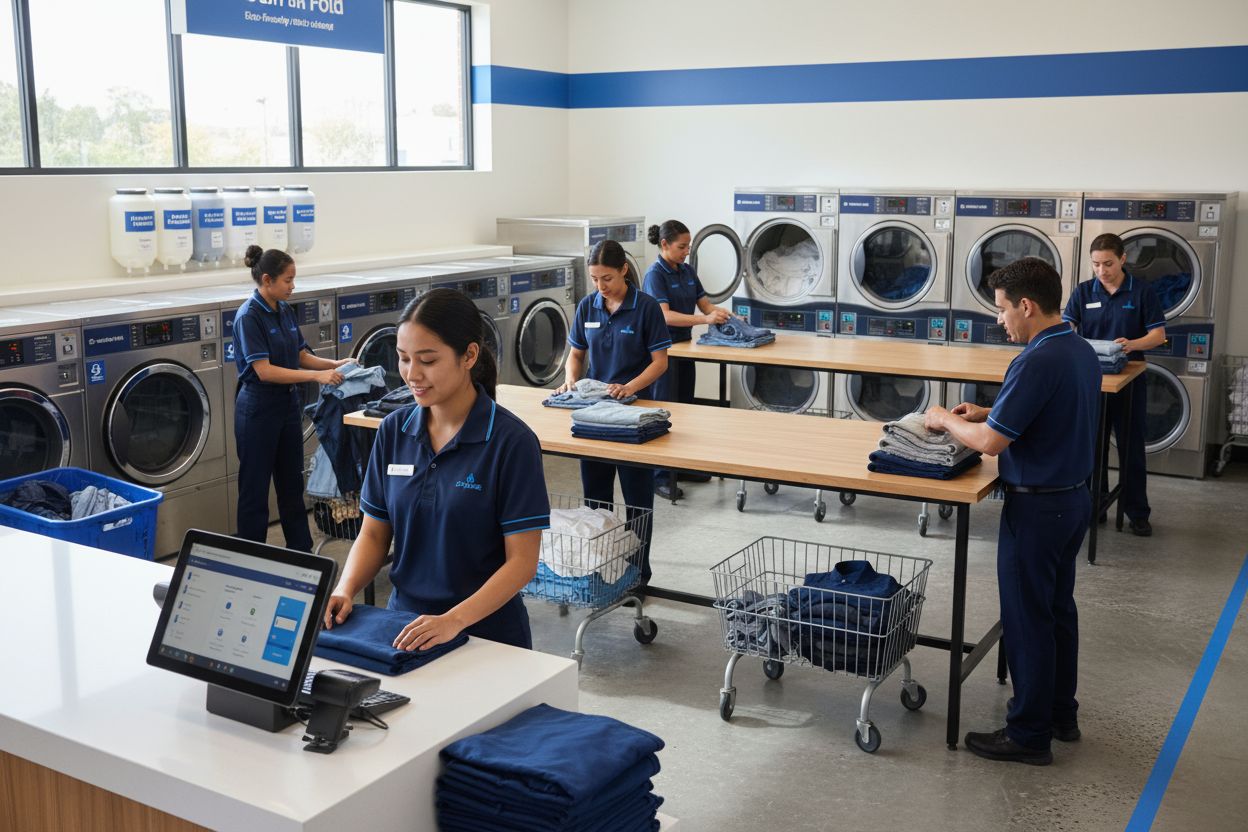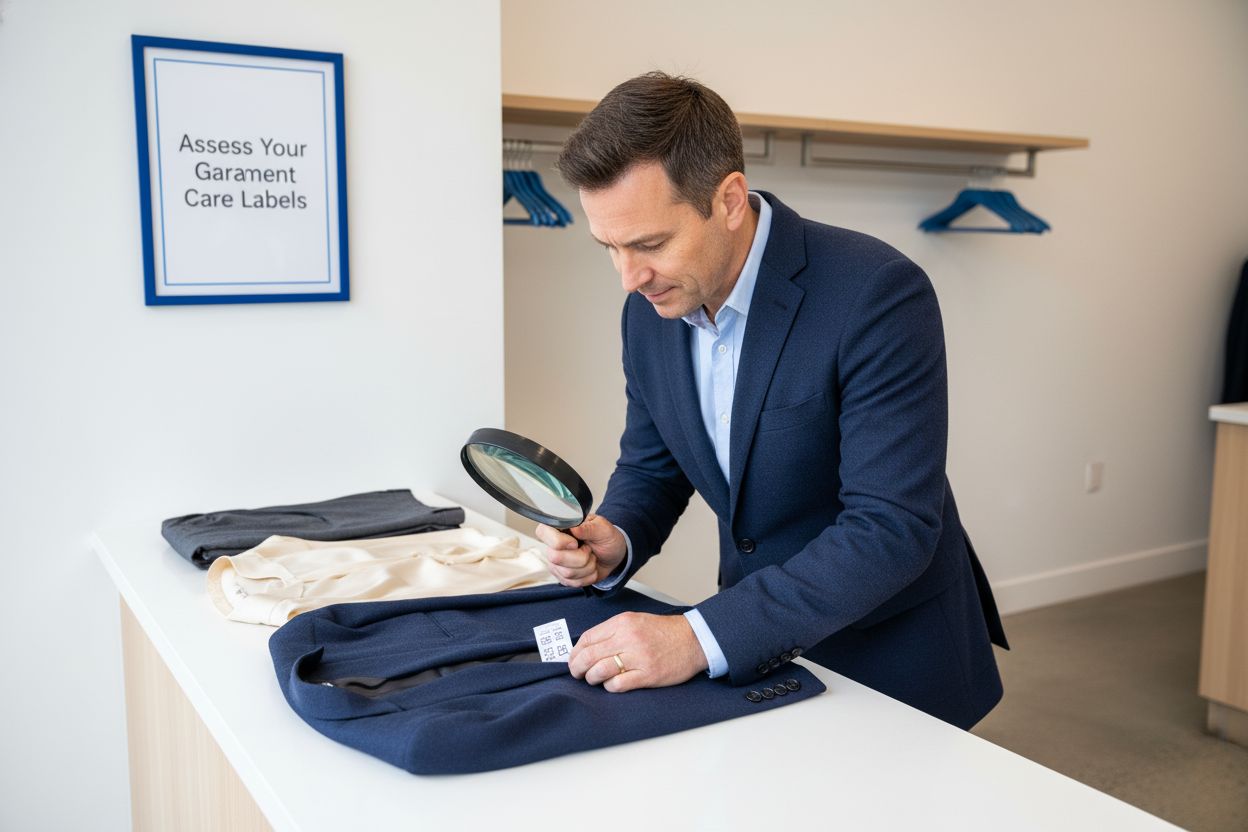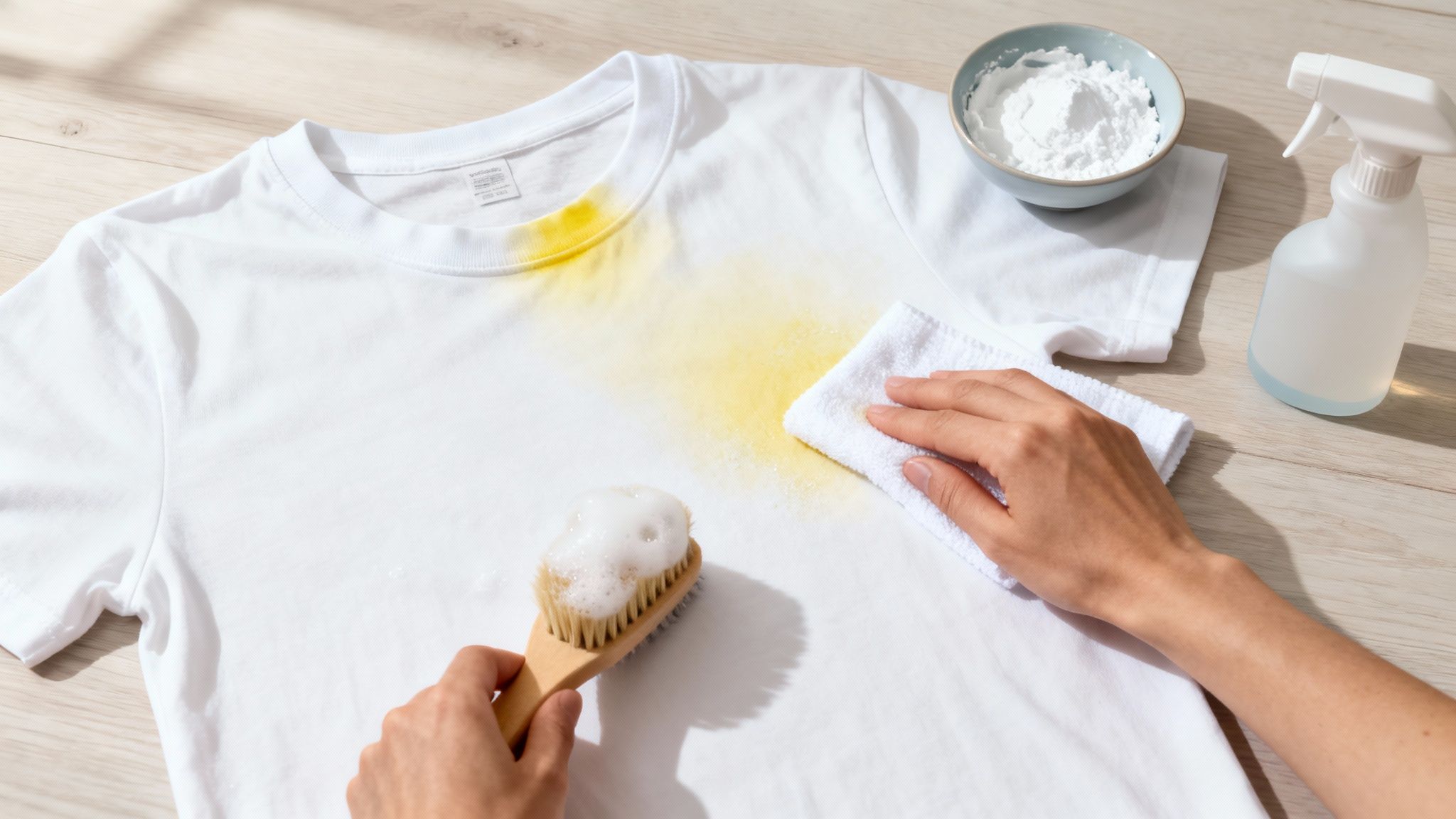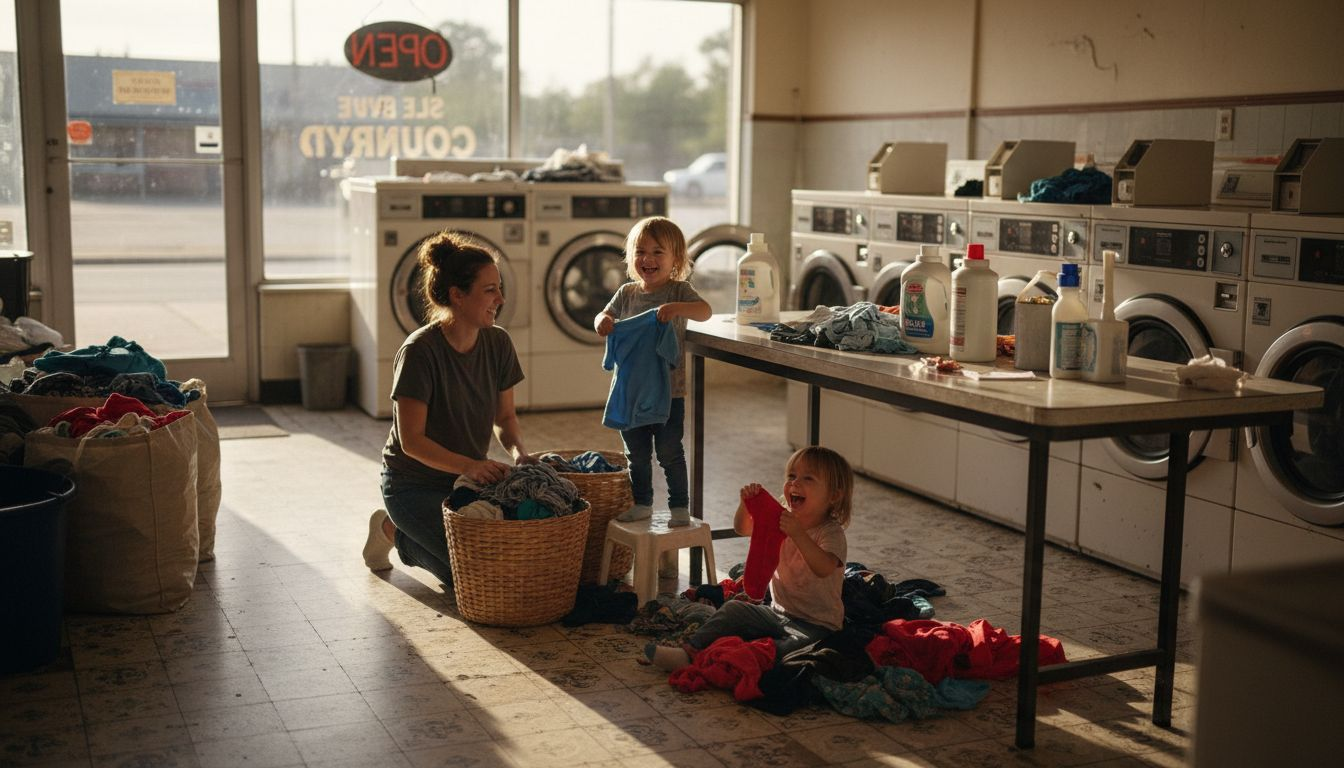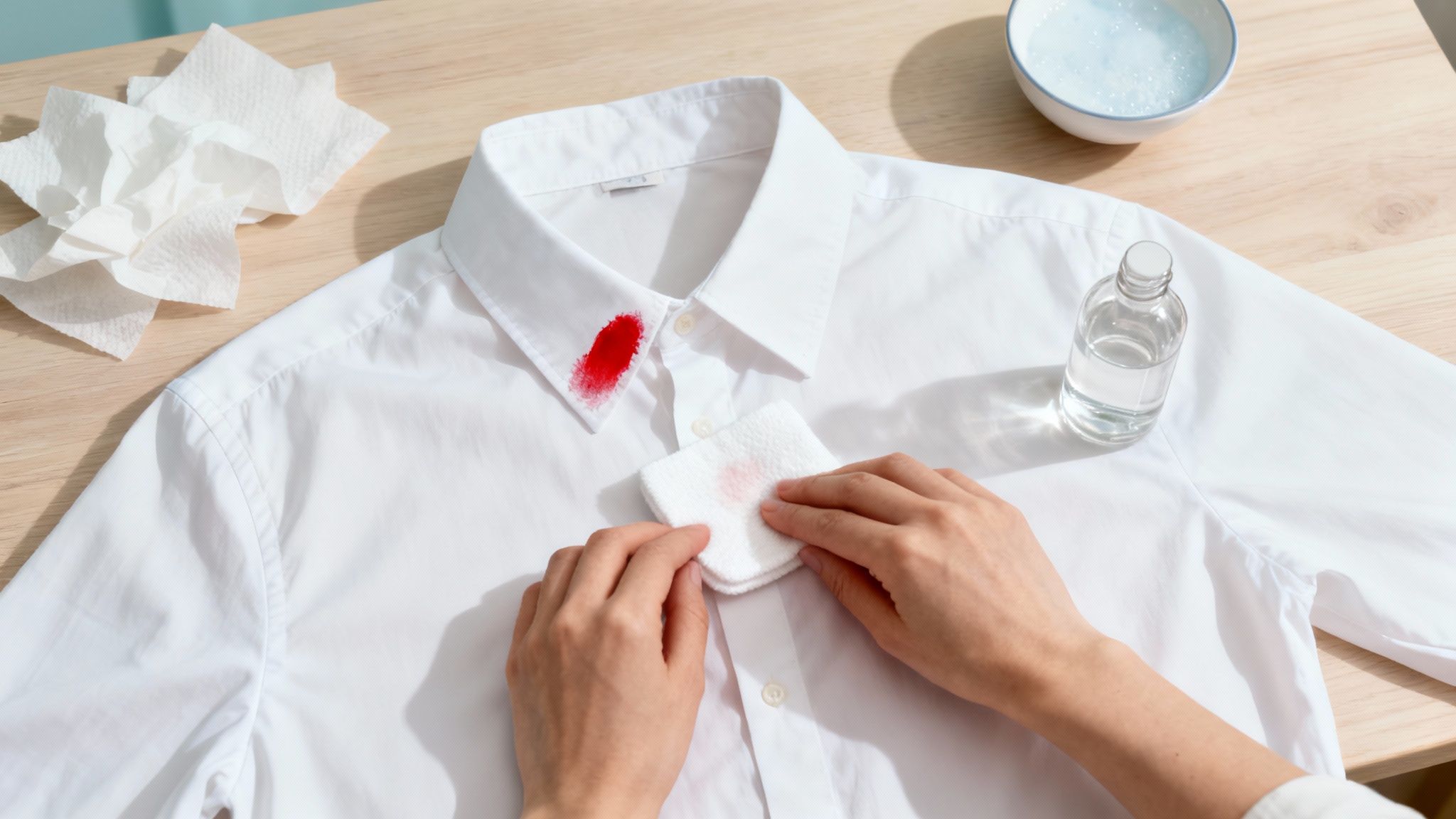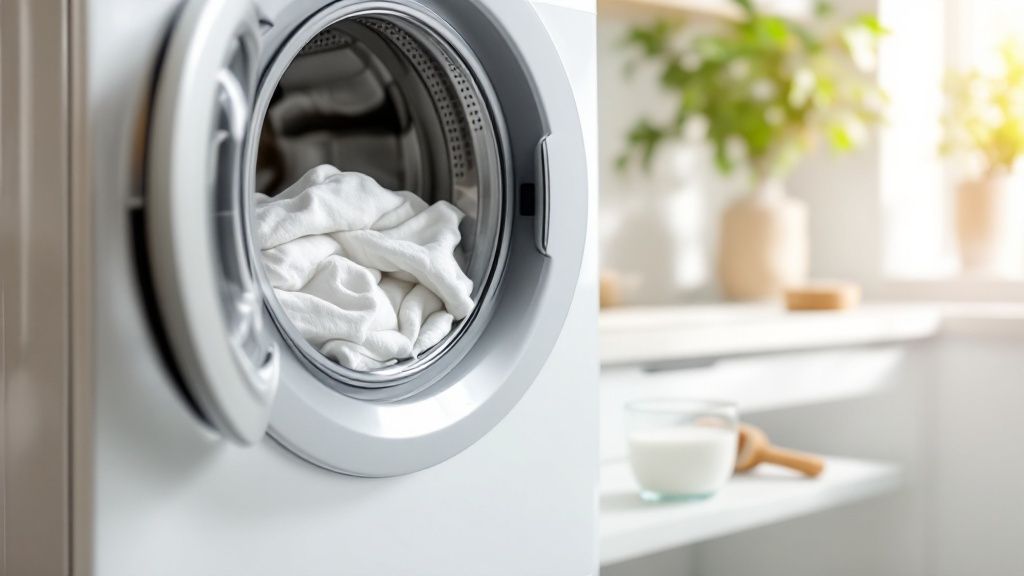Best Laundry Detergents for Sensitive Skin
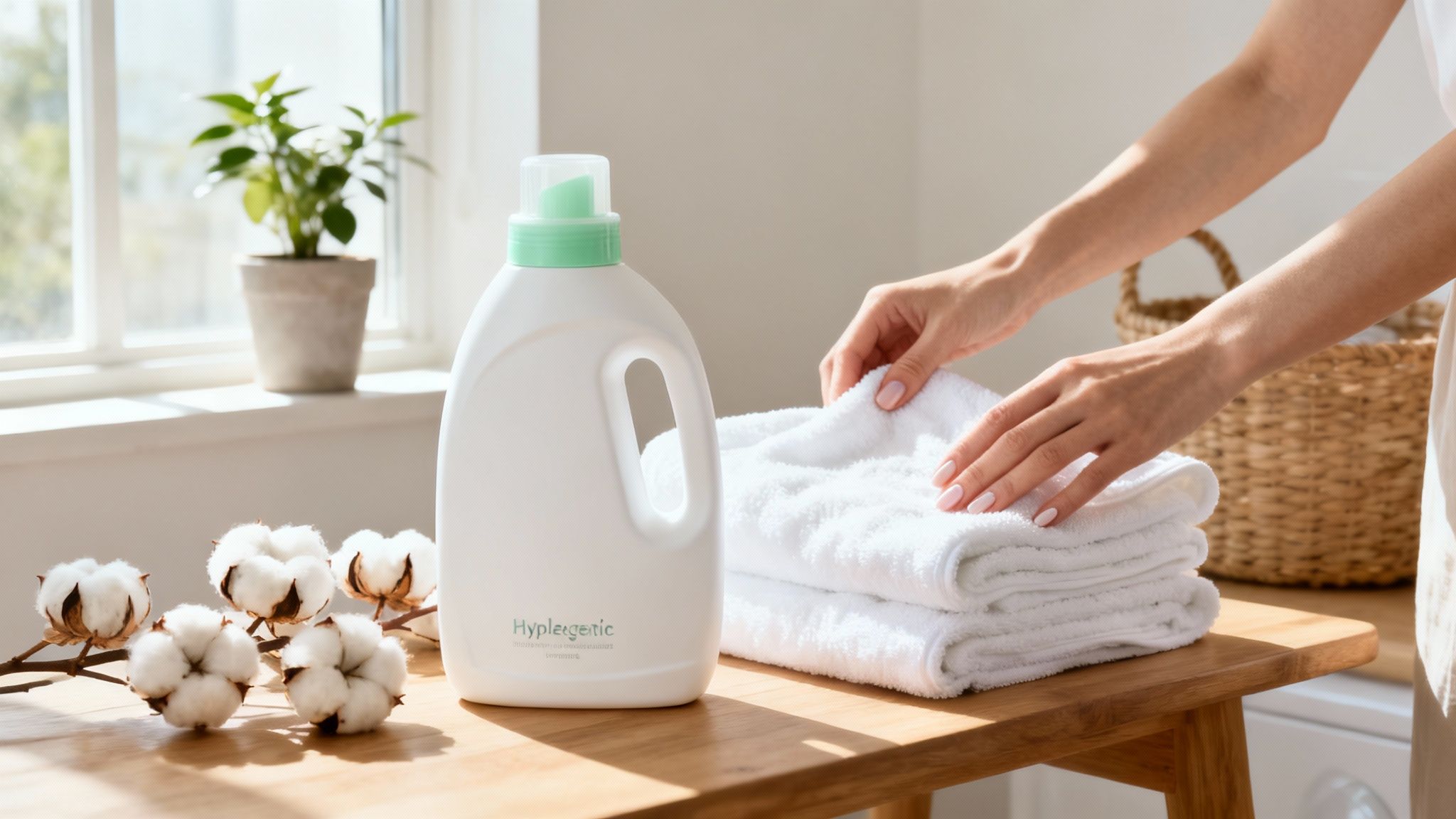
That frustrating itch or the surprise rash that shows up out of nowhere? There’s a good chance your laundry detergent is the culprit. So many conventional brands are packed with things like synthetic fragrances, dyes, and harsh sulfates that can really do a number on sensitive skin. These ingredients are notorious for stripping your skin’s natural protective oils and leaving behind a chemical residue on your clothes, often leading to contact dermatitis.
Why Your Detergent Is Causing Skin Irritation
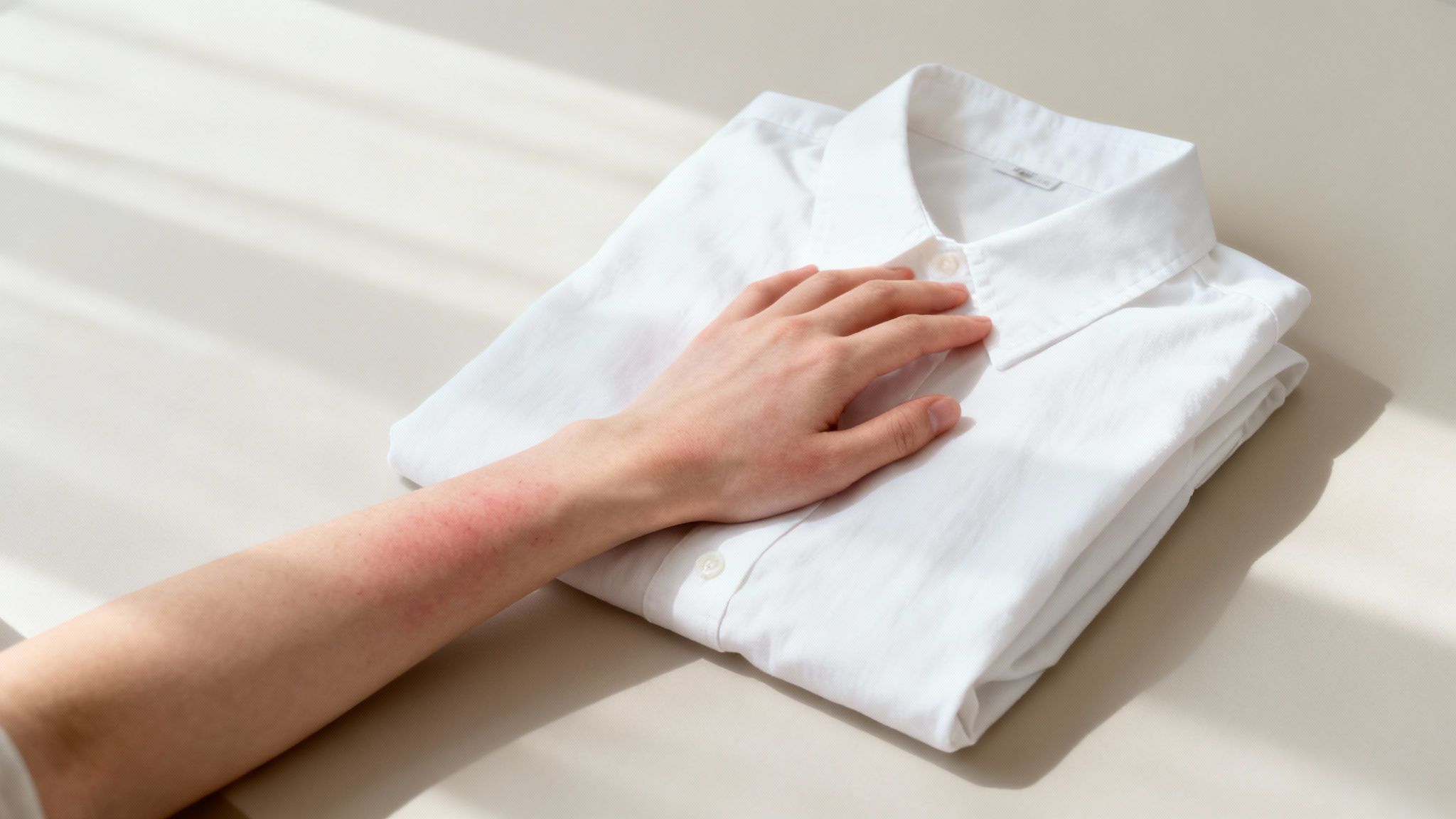
If you've ever put on a "clean" shirt only to feel that maddening, unexplainable itchiness set in, you're definitely not alone. Many standard detergents are loaded with powerful chemicals meant to make clothes look bright and smell fresh. While they get the job done, these additives are frequently the very reason your skin is acting up.
The problem usually comes down to a handful of specific ingredients that just don't play well with your skin's natural balance. Figuring out what they are is the first real step toward finding some relief.
Common Culprits Hiding in Your Laundry Soap
The biggest offenders are almost always fragrances and dyes. That "fresh linen" scent might sound lovely, but the synthetic chemicals used to create it are well-known allergens for a lot of people. Same goes for those bright blue or green dyes—they don't add any cleaning power but can easily trigger a reaction.
Beyond those, here are a few other ingredients to keep an eye out for:
- Sulfates (SLS/SLES): These are aggressive cleansing agents that create all those suds. The downside? They can strip natural oils from both your clothes and your skin.
- Optical Brighteners: These chemicals work by absorbing UV light to make fabrics appear whiter, but they leave behind a residue that can irritate sensitive skin.
- Preservatives: Certain preservatives, like methylisothiazolinone, are added to give products a longer shelf life but are also potent skin sensitizers.
People are catching on, and it's starting to change how they shop. The U.S. laundry detergent market, valued at USD 11.81 billion, is seeing a major shift toward gentle formulas that clean effectively without all the harsh stuff.
Choosing the right detergent is a huge part of managing skin health. Think about it—your clothes are touching your body all day long. Any residue left on them has the potential to cause irritation from morning to night.
Of course, your choice of detergent is just one piece of the puzzle. Understanding the best fabrics for sensitive skin can also make a world of difference. When you pair a gentle detergent with breathable, natural fabrics, you create a powerful combination for keeping your skin calm, happy, and comfortable.
How to Read Detergent Labels Like a Pro
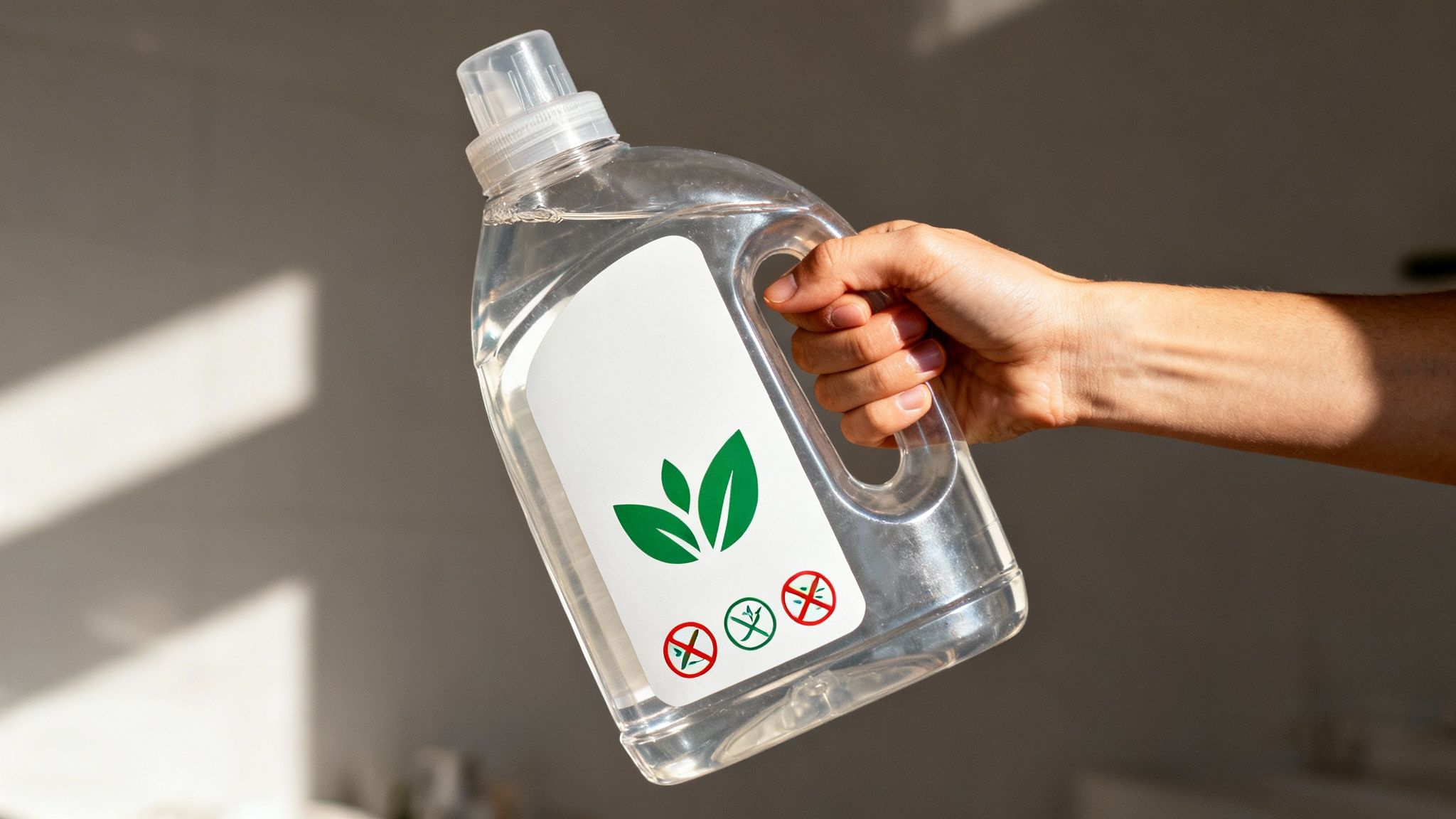
Walking down the detergent aisle can feel overwhelming. Every bottle seems to scream buzzwords like "hypoallergenic," "dermatologist-tested," and "plant-based." It’s tough to know what’s genuinely helpful and what's just clever marketing.
Here’s the secret: the real story isn't on the front of the bottle. It’s tucked away in the fine print on the back. Learning to quickly scan an ingredient list is the single best skill you can develop to find the best laundry detergent for sensitive skin. It turns you from a hopeful shopper into a confident one who knows exactly what you’re bringing home.
Unpacking Common Label Claims
First, let's break down some of the most common—and often misleading—phrases you'll see. Getting a handle on these is a game-changer for anyone with reactive skin.
- Fragrance-Free vs. Unscented: This one trips a lot of people up. "Fragrance-free" is what you want; it means no fragrances, period. "Unscented" can be tricky. It often means the manufacturer added more chemicals just to mask the scent of the ingredients, and those masking agents can be irritants themselves. Always go for fragrance-free.
- Hypoallergenic: This sounds official, but it just means the product is less likely to cause an allergic reaction. It's not a regulated term, so its meaning can vary wildly from one brand to another. Think of it as a good starting point, but not a guarantee.
- Dermatologist-Tested: This tells you a dermatologist was involved in testing the product on human skin. It’s a good sign, but it doesn't tell you what the test results were or how many people participated.
Honestly, the most reliable move is to ignore the flashy promises on the front. Flip that bottle over and head straight for the ingredient list—that’s where the truth is.
Key Ingredients to Watch For and Avoid
Once you're looking at the back of the bottle, your mission is simple: spot the good stuff and avoid the known troublemakers. You're looking for ingredients that clean effectively without being harsh.
To make it easier when you're in the store, here's a quick guide to what you should be looking for and what you should put back on the shelf.
Decoding Detergent Ingredients Common Irritants vs Gentle Alternatives
When you start focusing on detergents made with gentle, plant-derived surfactants and powerful enzymes, you get a great clean without the risk. Simply avoiding optical brighteners, sulfates, and dyes is a massive step toward protecting your skin from unnecessary chemical exposure. This small shift in how you shop puts you back in control, making every load of laundry a move toward happier, calmer skin.
Finding the Right Detergent for Your Lifestyle
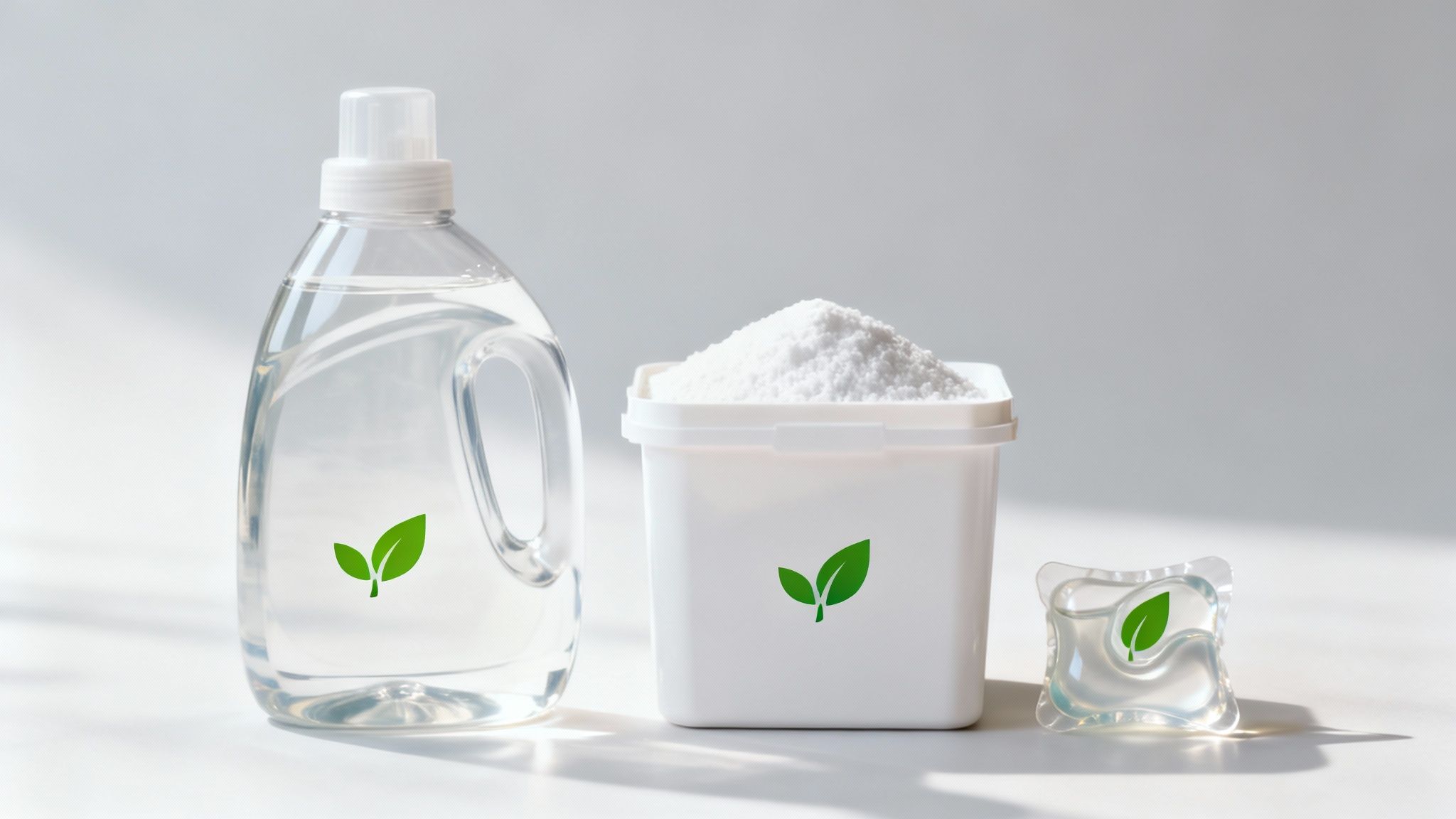
Let's be honest: there’s no single "best" detergent that works perfectly for every person and every load of laundry. The ideal formula for a family with a newborn is going to be wildly different from what an athlete needs for their high-performance gear.
Your lifestyle, laundry habits, and, most importantly, your skin’s own quirks all play a huge role in finding the right match.
For instance, families with young children almost always gravitate toward gentle, hypoallergenic formulas. You just have to look at the market for baby-specific detergents to see it—it's a massive industry projected to hit USD 3.4 billion by 2032 as parents hunt for the safest options. This focus on gentle care isn't just for babies, either; it's essential for anyone with eczema or other persistent skin conditions.
On the flip side, if your laundry basket is constantly overflowing with sweaty activewear, you need something with some serious odor-fighting power that won't leave you with a rash. This is where enzyme-based detergents really shine. They're designed to break down sweat and bacteria without resorting to harsh chemicals or overpowering fragrances.
Matching Detergent Type to Your Needs
The actual form of the detergent—whether it's liquid, powder, or a pod—also makes a difference. Each one has its own set of pros and cons, especially when you're on the hunt for the best laundry detergents for sensitive skin.
- Liquids: These are fantastic for pre-treating stains right on the fabric. They also dissolve easily in any water temperature, which means less risk of leaving behind residue that can irritate your skin.
- Powders: Often the more budget-friendly option, powders can be incredibly effective. The only catch is you have to make sure they dissolve completely to avoid that gritty film on your clothes.
- Pods: You can't beat the convenience of pre-measured pods. If you go this route, just be sure to pick a pod with a hypoallergenic formula and a casing that dissolves fully every time.
At the end of the day, it's all about finding that sweet spot between powerful cleaning and skin-friendly ingredients. A detergent that gets your clothes spotless but leaves you itchy just isn't worth it. Don't be afraid to experiment a little to see what works for you.
For those with extreme sensitivities, it can even be helpful to look at other ways to get clothes clean. We've put together a guide on how to wash clothes without detergent that offers some great insights. When you really think about your specific laundry challenges, you can narrow down the options and find a product that truly fits your life.
Laundry Habits That Soothe Sensitive Skin
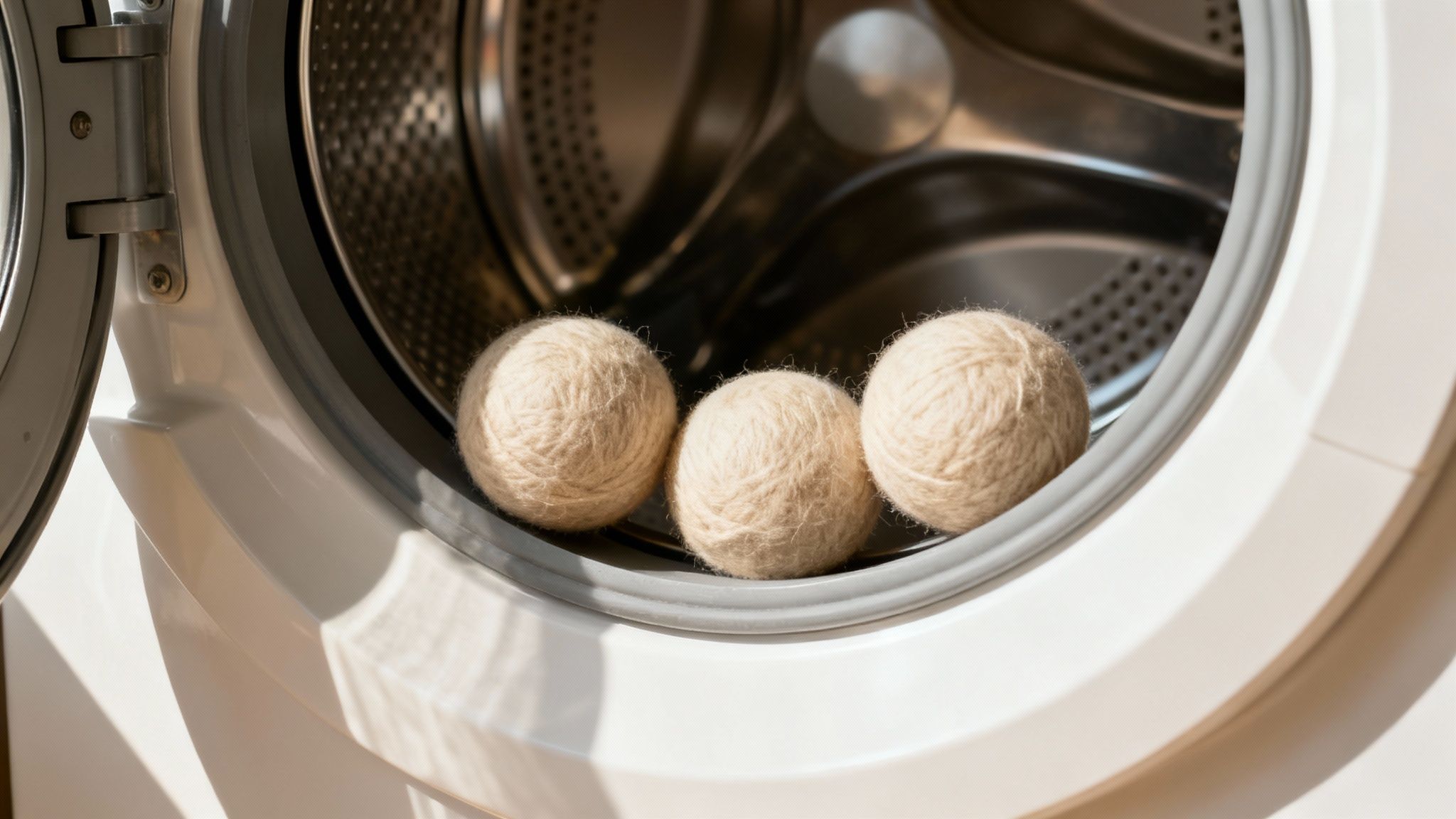
Choosing the right laundry detergent is a huge win, but your day-to-day laundry habits can either back up that choice or completely undermine it. A few simple tweaks to your routine can create an extra layer of protection, dramatically cutting down the chances of skin irritation.
One of the easiest and most effective changes? Hit that extra rinse cycle button on every single load. It’s a small step that goes a long way, making sure every last bit of detergent residue—even from the gentlest formulas—gets washed away. Think of it as a final polish for your fabrics, leaving them truly clean and free of potential triggers.
Another non-negotiable habit is to always wash new clothes before you wear them. Fresh-from-the-store garments are often treated with chemicals like formaldehyde to keep them looking crisp during shipping. These finishing agents are notorious skin irritants that a quick, simple wash can easily remove.
Gentle Alternatives and Smart Fabric Choices
Beyond the wash cycle itself, what you use to soften fabrics—and the fabrics themselves—play a huge role in keeping your skin happy. Unfortunately, traditional liquid softeners and dryer sheets often contain the very same fragrances and chemicals that make standard detergents a problem in the first place.
Here’s what to do instead:
- Swap Fabric Softener for Wool Dryer Balls: These are a fantastic natural alternative. They reduce static and soften clothes without coating them in a chemical film.
- Choose Natural, Breathable Fabrics: Your detergent is key, but the material touching your skin is just as important. Learning about the best fabrics for sensitive skin, like cotton and bamboo, can prevent irritation right from the start.
Making these small, consistent changes to your laundry routine provides a powerful defense against skin flare-ups. It's all about creating an environment where your skin feels comfortable and calm, not constantly under attack.
These principles become even more critical when you're washing clothes for the most delicate members of your family. For more targeted advice, our guide on the dos and don'ts of washing baby clothes breaks down even more helpful tips.
When to Consider a Professional Laundry Service
Let's be real—sometimes, even after you've found the perfect sensitive skin detergent, the battle against irritation isn't over. If you’re still dealing with flare-ups, managing a persistent condition like eczema, or just don’t have the time for a super meticulous laundry routine, calling in the pros is a smart, health-conscious move.
This is the point where outsourcing your laundry shifts from a simple convenience to a strategic choice for your family's well-being.
The Advantage of Professional-Grade Care
At Columbia Pike Laundry, we built our service with sensitive skin at the forefront of our minds. We get it. That's why, upon request, we stick exclusively to premium, hypoallergenic, and fragrance-free detergents that are proven to be gentle.
But the real game-changer? It’s our equipment. Our professional-grade washing machines can run a far more thorough rinse cycle than the one in your laundry room at home. This step is absolutely crucial for flushing out every last bit of detergent residue—often the final culprit behind lingering skin reactions.
As more people become aware of what's in their products, the demand for specialized laundry options is climbing. The U.S. laundry detergent market is actually expected to hit USD 28.5 billion by 2035, partly because of this shift toward gentler, skin-friendly formulas. You can read more about these laundry market trends to see how consumer needs are shaping the entire industry.
By handing the whole process over to us, you get your time back and receive perfectly clean, irritation-free laundry. Our laundry pickup and delivery service makes it incredibly easy to get this level of care without ever leaving your house.
Got Questions About Laundry for Sensitive Skin? We’ve Got Answers.
When you're dealing with sensitive skin, navigating the laundry aisle can feel overwhelming. It’s totally normal to have questions, and getting clear, straightforward answers is the first step toward finding a routine that finally works. Let's tackle some of the most common points of confusion we hear about all the time.
One of the biggest mix-ups is the whole "fragrance-free" vs. "unscented" debate. They sound similar, but they're worlds apart for sensitive skin. "Fragrance-free" is always the safer choice—it means exactly what it says: no fragrance chemicals have been added, period. "Unscented," on the other hand, can be a bit of a wolf in sheep's clothing. These products often use other chemicals to mask the natural smell of the detergent ingredients, and those hidden additives can be major skin irritants.
Getting the Best, Itch-Free Results
People often ask if just running an extra rinse cycle can make their regular detergent safe. While we're big fans of the extra rinse—it’s a great way to wash away leftover residue—it's not a silver bullet. Harsh chemicals and perfumes in standard detergents are designed to cling to fabric fibers. That's how they keep your clothes smelling "fresh" for days. An extra rinse might not be enough to get rid of them completely, which is why starting with a truly hypoallergenic formula is your best bet.
A quick word on DIY detergents: we get the appeal, but please be careful. Homemade laundry soaps can be a real wild card. They often have an unbalanced pH that can be harsh on both your skin and your clothes. Plus, many recipes call for ingredients like essential oils, which are surprisingly potent allergens for a lot of people.
Ultimately, you just can't beat a professionally formulated detergent that was created specifically for sensitive skin. These products go through testing to make sure they get your clothes clean without leaving behind the very things that make you itch. It takes all the guesswork out of the equation, so you can just do your laundry with confidence.
For a truly hands-off, worry-free solution, let the pros at Columbia Pike Laundry take over. We use premium, hypoallergenic detergents and professional-grade machines to get your clothes impeccably clean while being incredibly gentle on your skin. Schedule your first pickup and feel the difference for yourself.
Popular Blog Articles

Meet the Author
Daniel Logan didn’t start CPL because he loved laundry. He started it because his family was drowning in time debt, and laundry was one of the biggest weights.
Mornings were chaos with two kids under 5. Evenings felt like catch-up. And weekends? Gone to sorting socks and folding piles.
He knew his story wasn’t unique. So he built a business that gave families like his just a little bit of breathing room one load at a time.
With no laundry experience but deep tech skills, Daniel rolled up his sleeves, doing every job himself while building systems that turned it into a modern laundry service that saves customers time, simplifies their lives, and delivers reliability they can count on.
That’s where CPL began. Not from a playbook, but from pain. From one dad trying to buy back time: for himself, and for every household like his.


